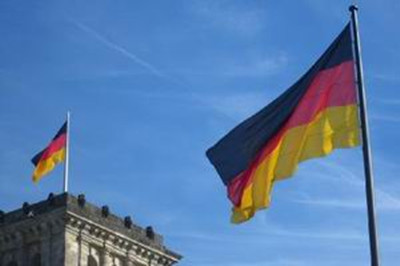(单词翻译:单击)
中英文本
Germany's economy
德国经济
Watching the wages
看工资
Germany's economy stutters, even if the fundamentals are strong
即使家底殷实,依然难逃困境
BLAMING Germany—or at least the austerity prescribed for the euro zone by Chancellor Angela Merkel—for Europe's ills may be popular in France. But Germans are inclined, not without some pride, to see their economy as the strongest horse to pull the euro zone out of its misery. Hence the fear caused by a surprising update this month: real output shrank by a seasonally adjusted 0.2% in the second quarter from the first, and manufacturing by 1%.
为了解决在法国肆虐的欧洲经济问题,德国—至少是德国总理默克尔,制定了经济紧缩计划。但是德国并没有居功自傲,他们更倾向于将自身经济看作一匹最强壮的马,来拉动欧元区走出困境。因此,这种令人惊讶的上升也在这个月带来了担忧:从第一季度到第二季度,真实输出缩减调整到0.2%,制造业调整为1%。
Part of the explanation was statistical. Thanks to a mild winter, there was more construction than usual in the first quarter. But geopolitical crises, especially in Ukraine, had a bigger impact. German exports to Russia have plummeted. Given the timing, the drop was due less to sanctions already imposed than to expectations of more to come. Russia accounts for only 3% of Germany's total trade, so the losses were easily made up in higher exports elsewhere. More devastating is the rising uncertainty over Russia that is causing managers to delay investment. Germany's Ifo business-climate index, a widely watched benchmark, fell in August.
说明中有一部分是统计结果。暖冬的原因使得统计结果与第一季度同期相比有了更多的解释。并且由于地域政治危机,特别在乌克兰,产生了更大的影响。德国对俄出口直线下降,因为给定了时间减少了制裁,下降比预期中来的更猛烈。而俄罗斯仅占有德国贸易总额的3%,所以在高出口的地方更容易出现损失。更糟糕的是,俄罗斯持续上涨的不确定性,导致了投资经理人的投资延误,被广泛视为基准的德国IFO商业景气指数在八月份也出现下降情况。
Aside from such new risks, however, the underlying German economy still looks strong. The federal budget is close to balance. Unemployment remains low: indeed, labour shortages are an increasing problem. This applies to large businesses such as care for the elderly, but especially to many of the niches for which Germany is famous, such as hearing-aid acoustics, according to the Cologne Institute for Economic Research.
除却这些新的风险,德国经济基础看起来依然强劲。财政预算趋于收支平衡,失业率也处在低水平范围:事实上,劳动力短缺问题日益严重。根据科隆经济研究所的报告,低失业率适用于那些负责照顾老人的大企业,特别是那些在德国境内十分著名的岗位,比如助听器声学。

Germany's best contribution to recovery in the euro zone would be to let wages rise. Whether they are already doing so will not become clear for months, because Germany reports the relevant statistics more slowly than most. But the willingness is there. In July Jens Weidmann, the president of the Bundesbank, Germany's notoriously hawkish central bank, caused a sensation by calling for pay rises of 3% on average. A new minimum wage should also nudge wages up. It will take effect in 2015 at 8.50 an hour, more than 40% of the median wage.
德国对于欧元区恢复的最大贡献在于让工资上涨。无论他们是否在这样做,几个月之内情势也不会明朗,因为德国的相关统计数据比大部分统计慢很多,不过人们对此毫无异议。七月,在德国众所周知的鹰派中央银行——德意志联邦银行的行长延斯·魏德曼要求加薪,引起了轰动。他要求的薪资平均上涨幅度为3%。一个新的最低工资标准也可以推动工资上涨。这项在2015年生效的新规定将每小时工资定位8.5英镑,超过了平均水平的40%。
Rising German wages would represent the “natural Hume mechanism at work, but with euros instead of gold,” says Michael Burda, an economist at Berlin's Humboldt University. By this he means the process first described by David Hume in the 18th century, under which countries on the gold standard adjusted to imbalances not by letting currencies appreciate or depreciate but through rising or falling prices and wages. In effect, Mr Burda says, the euro zone has imposed a gold standard on its 18 members. Prices and wages are falling in several crisis countries. Germany could help by letting its wages rise—if it is willing to accommodate this. If not, there is a serious risk that deflation could take hold across the euro zone as a whole.
柏林洪堡大学的经济学者迈克尔·布达说德国提高薪金水平代表“休谟自然体制运转的,是欧元不是黄金”。他的意思是,在休谟体制—由大卫·休谟在18世纪首次提出—下运转的金本位国家调整经济失衡应该通过提高物价和薪酬,而不是货币的升值或贬值。布达先生也表示,欧元区正在向它的18个成员国强加金本体制。物价和薪酬在一些高危国家有所下降。德国可以通过提高薪酬来帮助他们—如果他们愿意接受这个提案;否则,通货紧缩带来的一系列危机将笼罩整个欧元区。
German firms certainly have plenty of leeway, after practising wage restraint for the past decade. Known as the sick man of Europe ten years ago, Germany underwent a set of wrenching labour-market reforms starting in 2003. Unions co-operated meekly, often accepting wage rises below inflation and productivity growth. In effect, this was an internal devaluation that made exports more competitive, especially in sectors such as machines and chemicals, according to Karl Brenke at the German Institute for Economic Research in Berlin. The forgone spending power by workers also depressed consumption. The combination led to huge trade surpluses.
在过去十年实行的薪酬限制,让德国公司确信它们还有转圜的余地。正如十年前被全欧洲所知的“风险家”,德国自2003年开始经历了一系列复杂的劳动力市场改革。联盟向来是逆来顺受,经常在通货膨胀和生产率提高的情况下接受工资上涨的提议。柏林经济研究协会的卡尔·雪瑞尔克说,国内曾经发生的一场货币贬值实际上让出口变得更有竞争力。工人们丧失消费能力也使消费低迷,二者结合带来了巨大的贸易顺差。
Rising wages and consumption in Germany, if they are accepted, would partially reverse this trend. That would lead to smaller trade surpluses, as both the European Union and the Americans are demanding. The only other domestic lever is increased investment, both by the government and by companies, an area where Germany has been stingy in recent years. But because investing requires confidence, Russia is again proving a damper.
德国提高薪资和消费,如果人们接受,将会在一定程度上扭转现在的颓势,此举将会减小贸易顺差,这倒是欧盟和美国都希望出现的情况。在德国政府近年来缺乏的领域由政府和公司合作,不断上升的投资成为了国内仅剩的另一个杠杆。但由于投资强调信任,俄罗斯又一次成为了反面教材。
词语解释
1.even if 即使;虽然
Even if we cannot agree, we should maintain our contact.
即使我们不能取得一致, 我们也要保持联系。
Even if he doesn't like what she did,he is not going to deep-six her now.
他虽然对她所做的事不满,但现在还不想除掉她。
2.account for 对…负有责任;对…做出解释
Jack could not account for his foolish mistake.
杰克无法解释自己的愚蠢错误。
He has to account to the chairman for all the money he spends.
他必须向主席说明他所花掉所有钱的去向。
3.close to 接近;附近
We were close to when it happened.
事情发生时我们正在附近。
We all need our gods to be close to what we eat.
我们都需要我们的神在某种意义上接近我们的食物。
4.such as 比如;诸如
Heroes such as Huang Jiguang will always live in the hearts of the people.
像黄继光这样的英雄人物,将永远活在人民的心里。
But what if you have a lot of audio material to listen to, such as audio books or podcasts?
但是如果你有很多像有声书或播客这样的音频材料要听,那该怎么办呢?


